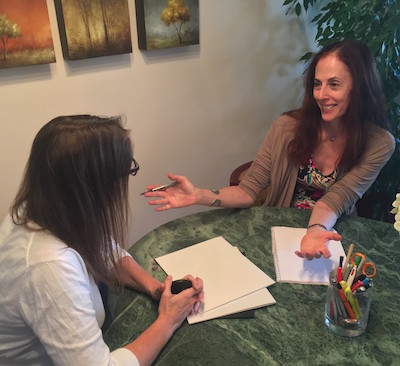 As a 60+ autism mom, keeping up my computer skills and helping my daughter Samantha with technology and social media can sometimes turn into an overwhelming double whammy. Now is one of those times.
As a 60+ autism mom, keeping up my computer skills and helping my daughter Samantha with technology and social media can sometimes turn into an overwhelming double whammy. Now is one of those times.
 Most of Giving Tuesday was devoted to sharing and emailing potential donors to EPIC Players, Samantha’s neurodiverse theater group. My mission (which turned out to be nearly impossible) involved helping her create a message to share via email and Facebook, asking friends and movie fans to contribute to EPIC Players. Executive Director Aubrie Therrien had made the task as simple as possible, setting up FB pages with links for each cast member, and providing a “template message.” Should have been easy-peasy to copy and paste, right?
Most of Giving Tuesday was devoted to sharing and emailing potential donors to EPIC Players, Samantha’s neurodiverse theater group. My mission (which turned out to be nearly impossible) involved helping her create a message to share via email and Facebook, asking friends and movie fans to contribute to EPIC Players. Executive Director Aubrie Therrien had made the task as simple as possible, setting up FB pages with links for each cast member, and providing a “template message.” Should have been easy-peasy to copy and paste, right?
Not so fast! Samantha wanted to create her own personal message, video and song. She labored over her words (with advice from her momager) and made a lovely video. Then our internet went down—just when she was ready to share her creation. At first we thought the problem was her phone, but then the computer conked out completely. To say we were both frustrated and stressed is an understatement.
 Today I spent several hours on the phone with two different Spectrum technicians. I thought my problem was solved when I hung up with Technician number one. We had enjoyed the eureka moment after 45 minutes of fiddling with wires, struggling to remember codes and passwords, plus connecting and disconnecting from two different WiFi networks. However, as soon as I hung up, my internet connection was lost AGAIN. I called Spectrum back immediately. Technician number two tried to help, but somehow my situation only got worse. I lost my gmail for the rest of the day and Spectrum promised to send another technician the next morning.
Today I spent several hours on the phone with two different Spectrum technicians. I thought my problem was solved when I hung up with Technician number one. We had enjoyed the eureka moment after 45 minutes of fiddling with wires, struggling to remember codes and passwords, plus connecting and disconnecting from two different WiFi networks. However, as soon as I hung up, my internet connection was lost AGAIN. I called Spectrum back immediately. Technician number two tried to help, but somehow my situation only got worse. I lost my gmail for the rest of the day and Spectrum promised to send another technician the next morning. 
Once everything is up and running again, new problems return. My extroverted and sometimes-too-friendly Samantha never likes to hurt anyone’s feelings, so she accepts ALL FB friend requests—Attila the Hun, Russian men (possible spies?) with no details in their profile, no posts and no friends; lone military types with no photos of family or friends at home; religious extremists from countries where women are treated as property. I’m stuck friending and monitoring all of these people too. Samantha must be protected from financial and sexual predators. How else can I supervise the situation unless I’m “friends” with these questionable strangers too?
Readers are probably thinking I should teach my daughter to be more discriminating, but that’s not as easy as it sounds. What guidelines would be useful for friending practices on FB? Do I tell my daughter not to friend anyone over a certain age? Should I teach her to delete all people from Russia because they might be promoting propaganda, trying to influence our elections? What about military personnel (with or without family pics), evangelicals from religious cults, or single men from troubled third world countries? Where is the line between prudent discernment and racism? There are no clear black and white rules here, and Samantha has trouble navigating nuances and gray areas. I don’t want my daughter to turn from a warm outgoing person into someone hateful and suspicious. On the other hand, I must try to prevent inappropriate men from pursuing her beyond the internet. I’ve already intervened with a few inappropriate men who “friended” both of us to explain that Face Timing or any other contact beyond cyberspace would not be happening on my watch.
Internet dating also offers serious challenges for my daughter. I’m already having a hard time helping Samantha turn aspiring suitors with disabilities into friends instead of romantic partners. Young men who say “I love you, Samantha” must be treated kindly but firmly. My daughter loves to enthuse about how she loves people, so getting her to tone it down and say in a matter-of-fact tone, “I love you too—as a friend” is quite the challenge. But it’s important for her to communicate clearly so that she doesn’t keep romantic hopes alive or be misleading—especially to young men on the spectrum who also have trouble deciphering social cues.
When Samantha was growing up, there were no sex education classes in her special ed schools. I hired an outsider to teach her the basics. Now my daughter is 27, and there are no classes on social media etiquette for young adults with autism. Samantha has the necessary computer skills to communicate on-line. She knows how to text, email, and share on social media. But somebody needs to help her navigate responsibly. That somebody can’t be me. (My heart is in the right place, but my tech skills aren’t).

New statistics say that 1 in 40 children is born on the spectrum. I hope there will be an education system in place when these children grow up, that not only teaches computer skills, but also how to use them safely and responsibly.
How much longer must autism parents wait?






 Marguerite Elisofon is a New York City writer and the author of My Picture Perfect Family, a memoir about how her family navigated life with a child on the autistic spectrum before the internet and support groups existed. She also blogs about parenting young adults and disability related issues in The Never Empty Nest. Her writing has been featured in a variety of publications, including Time and NY Metro Parents magazine, and her family’s story has been featured by the NY Post, Fox News, The Daily Mail, and on Jenny McCarthy’s Dirty Sexy Funny radio show. A Vassar graduate, Marguerite was born and raised in New York City, where she still lives with her husband, Howard, in their mostly-empty nest. She is available to speak about a wide variety of issues relating to twins, parenting, and autism.
Marguerite Elisofon is a New York City writer and the author of My Picture Perfect Family, a memoir about how her family navigated life with a child on the autistic spectrum before the internet and support groups existed. She also blogs about parenting young adults and disability related issues in The Never Empty Nest. Her writing has been featured in a variety of publications, including Time and NY Metro Parents magazine, and her family’s story has been featured by the NY Post, Fox News, The Daily Mail, and on Jenny McCarthy’s Dirty Sexy Funny radio show. A Vassar graduate, Marguerite was born and raised in New York City, where she still lives with her husband, Howard, in their mostly-empty nest. She is available to speak about a wide variety of issues relating to twins, parenting, and autism. 